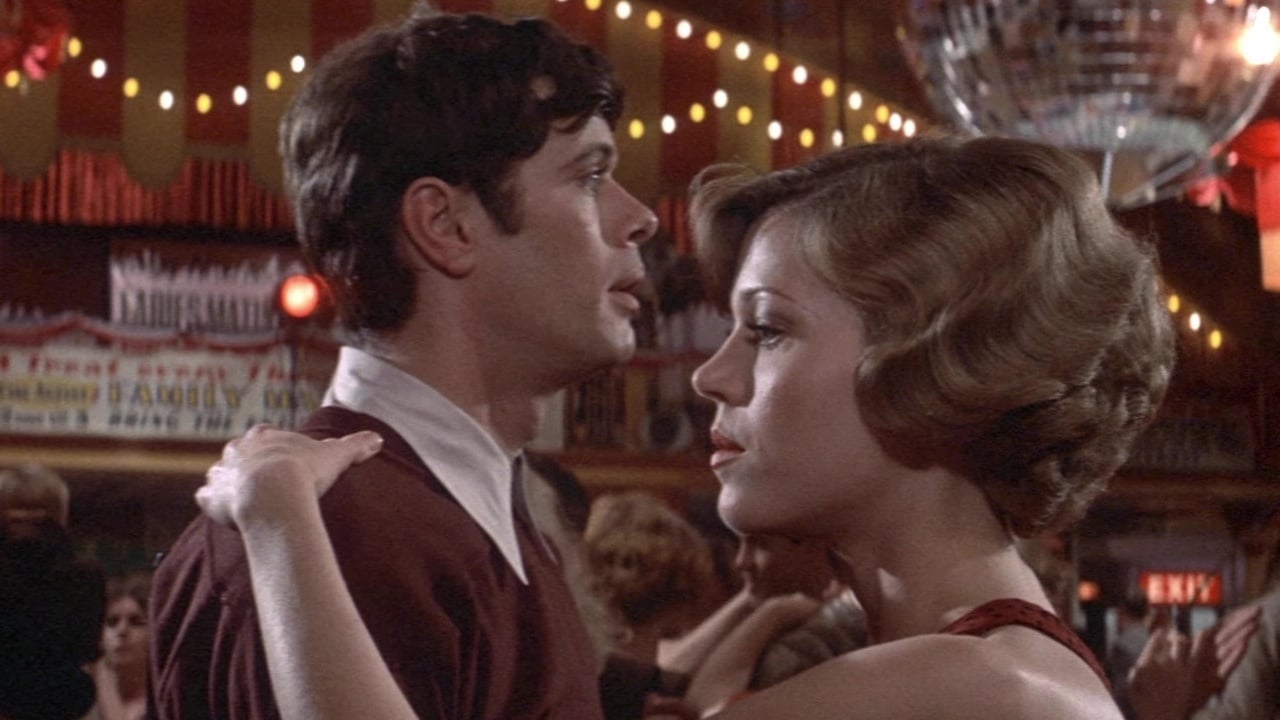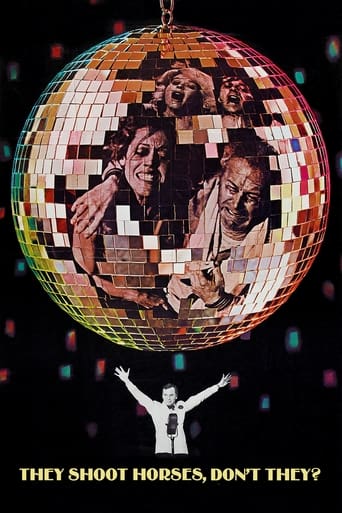

During the Great Depression, participating in dance marathons was a very popular activity. Couples would enter and dance nonstop for hours, days, weeks, or months, and audiences would flock to watch and cheer on their favorite team. The winning couple would receive some prize money, and in the meantime, the contestants would be fed and sheltered for as long as they endured. If you've never heard of this, or you're not up on your 1930s history, you might want to read up on the horrors of the Great Depression before renting They Shoot Horses, Don't They? If you don't really understand how desperate and hopeless these dance contestants felt, you might not be able to appreciate Robert E. Thompson's and James Poe's screenplay. The characters in the film act like condemned gladiators who will do anything to entertain the crowd before getting thrown into the lion's den. They stay on their feet no matter the cost, whether it's their health or dignity. They sleep while dancing, leaning on their partners, and one woman enters the contest while pregnant because she has no other prospects.They Shoot Horses, Don't They? is incredibly bleak. There are no happy parts to the story; this isn't a two-sided view of the famous walkathons of the Great Depression. The camera captures the up close and personal horrors the contestants experience, backstage and in front of the audience cheering in the stands. The audience is shown cheering when horrible things happen to the dancers; they treat them like animals in a horse race. Sydney Pollack directed the movie, and while it would have been easy to film it in a sensational, flashy manner, he chose a bleak approach. The colors are muted and dusty against the cheery façade of the event, and the sweaty and haggard faces show through the performance makeup.Jane Fonda, Michael Sarrazin, Susannah York, Red Buttons, Bruce Dern, Robert Fields, and Bonnie Bedelia are the featured dance contestants, and Gig Young is the MC. Everyone gives a superb performance, and Fonda, York, and Young were honored at the 1970 Oscars. Sydney Pollack was also nominated for his outstanding direction, as were the costumes, art direction, adapted screenplay, music, and editing. I've seen this film three times, but it isn't for everyone. It's extremely heavy and upsetting. But if you like movies that fall under the "people are terrible" mantra, like Network or The Great Gatsby, you'll be in a good position to appreciate this well-crafted film.Kiddy warning: Obviously, you have control over your own children. However, due to some upsetting content, I wouldn't let my kids watch this movie.
... View MoreThe early 1930's. Various down and out contestants put themselves through sheer physical, emotional, and psychological hell while participating in a grueling dance marathon for $1,500 dollars in prize money.Director Sydney Pollack offers a vivid and convincing evocation of the Great Depression-era period setting, maintains an unsparingly harsh and downbeat tone throughout, and astutely captures an overwhelming sense of despair, futility, and utter hopelessness. The pungent script by James Poe and Robert E. Thompson not only offers a potent and provocative meditation on the desperate measures people will resort to for the sake of fame, money, success, and survival, but also makes an equally profound statement on our culture's obsession with instant celebrity and how the premise of cruelty as entertainment serves as a means of enabling miserable spectators to take their minds off their own troubles for a while.The uniformly superb acting by the terrific cast helps a whole lot: Jane Fonda delivers a bang-up performance full of rage and defiance as the bitter and broken down Gloria, Michael Sarrazin makes a fine and sympathetic impression as the gentle and sensitive Robert, Gig Young totally deserved his Best Supporting Actor Oscar for his fabulously lived-in portrayal of the corrupt and cynical emcee, Susannah York likewise excels as glamorous aspiring actress Alice, Red Buttons contributes a wonderfully exuberant turn as the hearty Sailor, Bonnie Bedelia projects a sweet innocence as the pregnant Ruby, Bruce Dern does his usual ace work as Ruby's fierce ox of a husband James, and Robert Conrad and Paul Mantee are appropriately stern and steely as a pair of hard-nosed referees. Philip H. Lathrop's crisp cinematography thrusts the viewer right into the harrowing thick of the punishing ordeal. By no means a pleasant or comforting film, but nonetheless a highly effective and unforgettable one.
... View MoreIt's the Great Depression at the Santa Monica Pier near Hollywood. Robert Syverton (Michael Sarrazin) happens upon a dance marathon and is pulled in to participate. As a child, he witnessed the mercy killing of his horse. MC Rocky (Gig Young) makes him the replacement to Gloria (Jane Fonda)'s sick partner. She's a bitter woman and the years have not been kind to her. Other participants include confident elderly sailer Harry Kline (Red Buttons), aspiring actors Alice (Susannah York) and Joel (Robert Fields), and poverty-stricken James (Bruce Dern) and his pregnant wife Ruby (Bonnie Bedelia) who are willing to dance simply for the food.Director Sydney Pollack is able to bring a sense of rising desperation to the movie. Fonda has a great broken character. They are all great. This is a broken world full of broken people. It does meander a bit with the flashbacks and internal squabbles but each derby injects more harrowing energy to the movie. It has great desperation.
... View MoreI watched for the first time last night - certainly relentlessly grim but gripping & brilliant nevertheless. I don't always like Jane Fonda's performances but I thought she ACED this one: there's no humour which makes it a challenge, but her brittle cynicism is entirely convincing. The script & direction are equally impressive: when do the dance contest audience change from cheering on talent contestants to sick voyeurs (which I guess includes us,continuing to watch the film) waiting for the first person to drop - Can you spot the moment? I agree with other reviewers, it's a film that sticks in your head, I'm still thinking about it now. At the start, everyone's focused on the little things - a missing dress, a cigarette, watching out for the producer who could give you your big breaks. Then of course it gets into the big stuff: dreams, ambition, illness, age, pregnancy, obsession, frailty and death - before returning to the little details at the end - a pair of ripped stockings. Interesting for story tellers as well as film watchers.
... View More